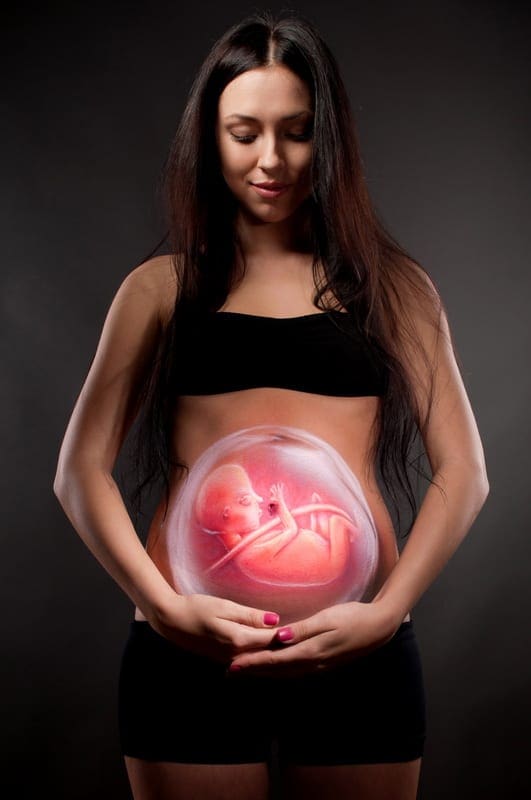Breastfeeding is one of the most important decision a mother can make for her child. It has both short-term and long-term benefits for both the mother and the child. In the short-term, breastfeeding can help the baby bond with the mother and also help the baby’s immune system. Breastfeeding can also help the mother heal from childbirth and postpartum faster. In the long-term, breastfeeding has been linked to lower rates of obesity, diabetes, and some childhood cancers. There are also many benefits for the mother. In the short-term, breastfeeding can help the mother bond with her child and also help her heal from childbirth and postpartum faster. In the long-term, breastfeeding has been linked to lower rates of obesity, diabetes, and some cancers. So, not only is breastfeeding good for the baby, but it is also good for the mother. Breastfeeding is a win-win for both mother and child.
1. The physical benefits of breastfeeding for mom include: – a decrease in the risk of ovarian and breast cancer – a lower chance of developing osteoporosis – a smaller chance of developing type 2 diabetes 2. The physical benefits of breastfeeding for baby include: – a decrease in the risk of Sudden Infant Death Syndrome (SIDS) – a lower chance of developing obesity – a lower chance of developing type 1 and 2 diabetes – a lower chance of developing asthma 3. The psychological benefits of breastfeeding for mom include: – bonding with baby – a sense of accomplishment – increased confidence 4. The psychological benefits of breastfeeding for baby include: – a sense of security – feeling of comfort 5. The financial benefits of breastfeeding for mom include: – savings on formula – savings on doctor’s visits 6. The financial benefits of breastfeeding for baby include: – savings on formula – savings on doctor’s visits 7. The environmental benefits of breastfeeding include: – less packaging and cans to throw away – no need to power/heat up formula
1. The physical benefits of breastfeeding for mom include:
Breastfeeding provides countless physical benefits for both mother and child. For the mother, breastfeeding can help to shrink the uterus back to its pre-pregnancy size, help with weight loss, and decrease the risk of developing certain diseases such as ovarian cancer, breast cancer, and type 2 diabetes. In addition, breastfeeding can help to improve the mother’s bond with her child. For the child, breastfeeding provides a host of physical benefits as well. Breast milk is packed with antibodies and nutrients that help to boost the child’s immune system and protect against illnesses such as colds, ear infections, and diarrhea. In addition, breastfeeding can help to improve the child’s cognitive development and decrease the risk of developing obesity and type 2 diabetes later in life. While the physical benefits of breastfeeding are numerous, it is important to remember that the emotional benefits are just as important. Breastfeeding can help to improve the mother’s bond with her child, and it can also help to decrease the risk of postpartum depression. In addition, breastfeeding can provide a sense of calm and relaxation for both mother and child.
– a decrease in the risk of ovarian and breast cancer
There are many benefits to breastfeeding for both the mother and baby. One of the benefits is that there is a decrease in the risk of ovarian and breast cancer. When a woman breastfeeds, she is actually decreasing her lifetime risk of developing breast cancer. This is because breastfeeding lowers the levels of the hormone estrogen in the body, and estrogen is one of the main culprits behind breast cancer. So, not only does breastfeeding protect the baby from disease, it also protects the mother. Ovarian cancer is another type of cancer that is reduced by breastfeeding. This is likely due to the fact that breastfeeding lowers the levels of the hormone estrogen in the body. As with breast cancer, estrogen is thought to play a role in the development of ovarian cancer. So, by decreasing the levels of estrogen through breastfeeding, the mother is also decreasing her risk of developing ovarian cancer. Not only does breastfeeding offer protection from cancer, but it also has other benefits for the mother. For example, breastfeeding can help the mother to lose weight after pregnancy, and it can also help to decrease the risk of developing type 2 diabetes. So, there are many benefits to breastfeeding for both the mother and baby. If you are considering breastfeeding, talk to your healthcare provider to see if it is right for you.
– a lower chance of developing osteoporosis
A recent study published in the American Journal of Clinical Nutrition found that women who breastfeed have a lower risk of developing osteoporosis. Osteoporosis is a condition characterized by thinning bones and a decrease in bone mass. This can lead to bones that are more fragile and susceptible to fractures. The study followed nearly 3,000 women over the course of 20 years. They found that those who had breastfed their babies had a 4% lower risk of developing osteoporosis compared to those who did not breastfeed. There are a few theories as to why breastfeeding may help protect against osteoporosis. One is that the hormones released during breastfeeding, such as prolactin and oxytocin, help to stimulate the growth of new bone. Another theory is that breastfeeding helps to reduce inflammation in the body. Inflammation has been linked to a decrease in bone density and an increased risk of osteoporosis. So, not only is breastfeeding beneficial for your baby, but it may also help to protect you from developing osteoporosis later in life.
– a smaller chance of developing type 2 diabetes
When it comes to diabetes, both type 1 and type 2, there are a few benefits that breastfeeding can have for both the mother and child. For the mother, breastfeeding can help to regulate blood sugar levels which can be beneficial for diabetic women. In terms of the child, researchers have found that those who were breastfed as infants have a lower chance of developing type 2 diabetes later on in life. There are a few different mechanisms that are thought to be at play here. For one, it is believed that the act of breastfeeding helps to increase insulin sensitivity. This is thought to be due to the release of a hormone called adiponectin that occurs during breastfeeding. Adiponectin helps to regulate metabolism and blood sugar levels, and so by increasing insulin sensitivity, it can help to lower the risk of type 2 diabetes. Another benefit of breastfeeding is that it can help to promote a healthy gut microbiota. The gut microbiota is a collection of microbes that live in the gastrointestinal tract, and it is thought that a healthy gut microbiota is important for maintaining blood sugar levels. Furthermore, a healthy gut microbiota has also been linked to a lower risk of obesity, and since obesity is a risk factor for type 2 diabetes, this is another way in which breastfeeding can help to reduce the risk of type 2 diabetes. So, in conclusion, there are a few different ways in which breastfeeding can help to reduce the risk of type 2 diabetes, both for the mother and child. If you are a diabetic woman who is looking to breastfeed, then you may be glad to know that there are some potential benefits for you and your child.
2. The physical benefits of breastfeeding for baby include:
The physical benefits of breastfeeding for baby include a decrease in the risk of SIDS, ear infections, and gastroenteritis. breastfeeding also helps to protect against allergies, asthma, and obesity. SIDS, or sudden infant death syndrome, is the leading cause of death in infants 1 month to 1 year old. While the causes of SIDS are still unknown, experts believe that breastfeeding may play a role in protecting against it. A study published in the journal Pediatrics found that infants who were breastfed had a significantly lower risk of SIDS than those who were not. Ear infections are one of the most common childhood illnesses. They are most often caused by bacteria or viruses entering the middle ear through the Eustachian tube. Breastfeeding has been shown to reduce the risk of ear infections, as breast milk contains antibodies that can help to fight off infection. Gastroenteritis, or stomach flu, is another common childhood illness. It is usually caused by a virus, and can be very serious, particularly in young infants. Breastfeeding has been shown to reduce the risk of gastroenteritis, as breast milk contains antibodies that can help to fight off infection. Allergies, asthma, and obesity are all becoming more common in children. While the exact causes are unknown, experts believe that they may be related to the increasing number of children who are not breastfed. Breastfeeding has been shown to reduce the risk of allergies, asthma, and obesity.
– a decrease in the risk of Sudden Infant Death Syndrome (SIDS)
Sudden Infant Death Syndrome, or SIDS, is a problem that affects a small percentage of babies. While the cause of SIDS is unknown, there are a number of things that can decrease the risk of a baby dying from it. One of these is breastfeeding. Breastfeeding has a number of benefits for both mother and child. For the baby, it can help to provide immunity against a number of diseases and illnesses. It can also help to promote healthy development, both physical and cognitive. For the mother, it can help to speed up the healing process after childbirth, and can also help to reduce the risk of developing certain cancers. There is some evidence to suggest that breastfeeding may also help to reduce the risk of SIDS. One theory is that it may help to promote a healthy gastrointestinal tract. This is important because a number of babies who have died from SIDS have been found to have an imbalance in the bacteria in their gut. Breastfeeding can help to restore this balance. Another theory is that breastfeeding may help to regulate a baby’s breathing. This is important because one of the risk factors for SIDS is irregular breathing. Breastfeeding can help to keep a baby’s breathing regular and strong. So, while the exact cause of SIDS is still unknown, there is evidence to suggest that breastfeeding may help to reduce the risk. For this reason, it is recommended that mothers breastfeed their babies if they can.
– a lower chance of developing obesity
Breastfeeding has been shown to have a number of benefits for both mother and child. One of these benefits is that it can help to lower the chance of developing obesity. Obesity is a problem that is becoming increasingly common in developed countries. It is a major health problem because it is linked to a number of other conditions such as type 2 diabetes, heart disease, and stroke. Breastfeeding has been shown to be one of the most effective ways to prevent obesity. In fact, a review of studies that was published in the American Journal of Clinical Nutrition found that breastfeeding significantly reduced the risk of obesity in children. The mechanisms by which breastfeeding protects against obesity are not fully understood. However, it is thought that it may be due to the fact that breast milk promotes a healthy gut microbiome. The gut microbiome is the community of microorganisms that live in the intestine. There is also evidence to suggest that breastfeeding helps to regulate appetite. This may be because breast milk contains hormones that help to regulate hunger and fullness. The benefits of breastfeeding for both mother and child are clear. Breastfeeding can help to prevent obesity, and it is also linked to a number of other health benefits.
Breastfeeding is one of the most natural and beneficial things a mother can do for her baby. Not only does it provide the perfect nutrition for a baby’s developing body and immune system, but it also helps to bonding and establish a strong connection between mother and child. Additionally, breastfeeding can help to improve a mother’s health and well-being, and has been shown to lower the risk of certain diseases and conditions, such as breast cancer, ovarian cancer, and type 2 diabetes.











